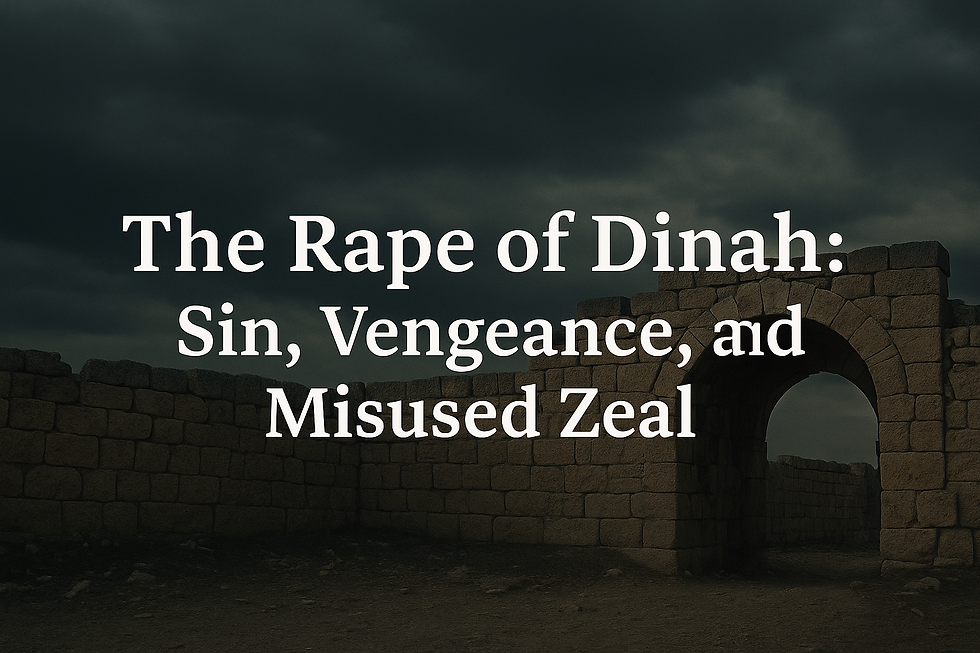Hamor: The Father of Shechem and the Failed Negotiator
- Bible Believing Christian

- Sep 5, 2025
- 4 min read

Hamor: The Father of Shechem and the Failed Negotiator
Hamor, the Hivite ruler of the city of Shechem, is remembered in Genesis 34 as the father of Shechem and the one who tried to negotiate peace after his son violated Dinah, the daughter of Jacob and Leah. Though he sought to unite his people with Jacob’s family through marriage and alliance, his failure to address his son’s sin and his attempt at compromise brought destruction on his city. Hamor’s story reveals the dangers of ignoring justice, the false security of worldly alliances, and the seriousness of covenant separation.
Name & Etymology
The name Hamor (חֲמוֹר, Ḥămôr, pronounced hah-more) means “donkey” in Hebrew, a name that may reflect strength, stubbornness, or social position. In the Septuagint, his name is rendered Emmor (Ἐμμώρ).
Biblical Narrative (The Story)
After Shechem violated Dinah, Hamor stepped in to mediate. He went to Jacob and his sons and said: “My son Shechem is truly in love with your daughter. Please let him marry her” (Genesis 34:8, NLT). He proposed an alliance: “In fact, let’s arrange marriages so that you give us your daughters for our sons, and we will give you our daughters for your sons. You may live among us; the land is open to you. Settle here and trade with us, and feel free to buy property in the area” (Genesis 34:9–10, NLT).
Hamor’s appeal was not only about Shechem’s desire for Dinah but about merging the two peoples economically and socially. His focus on material benefits and intermarriage revealed a disregard for the covenant identity of Jacob’s family.
Jacob’s sons, enraged at the violation of Dinah, responded with deceit. They demanded that all the men of the city be circumcised if they were to intermarry (Genesis 34:13–16). Hamor and Shechem persuaded the men of the city to comply, saying, “These men are our friends. Let’s invite them to live here and do business. Look, the land is large enough to hold them. We can intermarry with them and their livestock and possessions will eventually be ours!” (Genesis 34:21, NLT).
But on the third day, while the men were still sore, Simeon and Levi attacked, killing Hamor, Shechem, and every male of the city, and rescuing Dinah (Genesis 34:25–26).
Historical & Cultural Context
Hamor’s attempt to negotiate through marriage reflected common practices in the ancient Near East. Intermarriage was often used to solidify alliances and expand influence. His emphasis on trade and shared property also reflects political strategy.
However, for Jacob’s family, such assimilation threatened their covenant distinctiveness. The proposal of Hamor symbolized the constant temptation for God’s people to blend into surrounding nations.
His failure to confront his son’s sin also illustrates how leaders often prioritized diplomacy and gain over justice.
Character & Themes
Hamor is portrayed as a mediator, but one who compromised integrity for expediency. He valued alliances and economic opportunity more than addressing the injustice done to Dinah.
Themes in his story include:
Compromise vs. covenant faithfulness: the danger of blending God’s people with the nations.
False peace: trying to paper over sin with negotiation rather than repentance.
The consequences of neglecting justice: his failure to act rightly led to destruction.
Connection to Christ
Hamor’s attempt at compromise contrasts with Christ’s approach to reconciliation. Where Hamor ignored sin and sought peace without justice, Christ dealt with sin directly at the cross, securing true reconciliation between God and humanity.
Hamor’s story reminds us that peace without righteousness is fragile and false. Only in Christ do justice and mercy meet perfectly.
Theological Significance
Hamor’s life underscores the biblical truth that God’s people are called to holiness and separation. His proposal represented assimilation, but God’s covenant demanded distinction.
Theologically, his story highlights that peace cannot be bought through compromise or material gain but must be rooted in truth and justice.
Myths & Misconceptions
One misconception is that Hamor was only trying to do good. While he sought peace, his motivations were tainted by self-interest—his promise to his townsmen was that Jacob’s wealth would become theirs (Genesis 34:23).
Another misconception is that his proposal represented genuine repentance. In fact, he ignored Shechem’s sin and focused only on political union.
Some also assume that Jacob’s sons acted rightly in rejecting him. But their violent deception was also condemned. Both Hamor’s compromise and Jacob’s sons’ vengeance fell short of God’s righteousness.
Application
Hamor’s story warns us of the dangers of pursuing peace without truth and justice. It challenges us to confront sin rather than cover it with compromise.
It also reminds us to guard against assimilation into the world’s systems at the expense of our covenant identity in Christ.
Conclusion
Hamor, the father of Shechem, sought to negotiate peace after his son violated Dinah. But his compromise ignored justice and threatened Israel’s covenant identity. His failure, combined with the vengeance of Simeon and Levi, brought destruction on his city. Hamor’s story stands as a warning that true peace can only be found where justice and righteousness are upheld, pointing ultimately to Christ, who reconciles with both mercy and truth.


